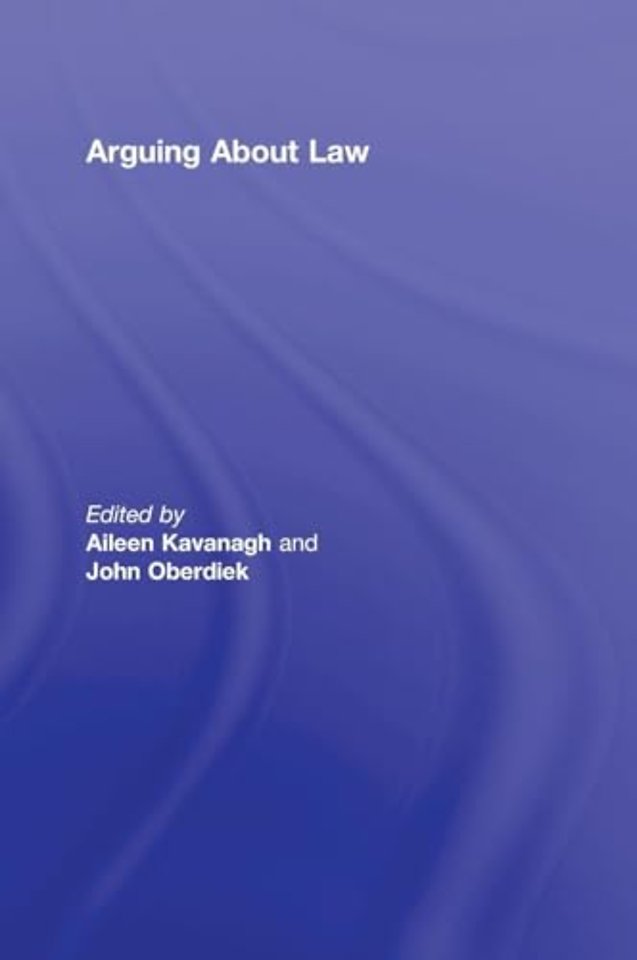Arguing About Law
Samenvatting
Arguing about Law introduces philosophy of law in an accessible and engaging way. The reader covers a wide range of topics, from general jurisprudence, law, the state and the individual, to topics in normative legal theory, as well as the theoretical foundations of public and private law. In addition to including many classics, Arguing About Law also includes both non-traditional selections and discussion of timely topical issues like the legal dimension of the war on terror.
The editors provide lucid introductions to each section in which they give an overview of the debate and outline the arguments of the papers, helping the student get to grips with both the classic and core arguments and emerging debates in:
- the nature of law
- legality and morality
- the rule of law
- the duty to obey the law
- legal enforcement of sexual morality
- the nature of rights
- rights in an age of terror
- constitutional theory
- tort theory.
Arguing About Law is an inventive and stimulating reader for students new to philosophy of law, legal theory and jurisprudence.
Specificaties
Inhoudsopgave
1: The Nature of Law: Framing the Debate
1. Oliver Wendell Holmes, The Path of the Law
2. H. L. A. Hart, Positivism and the Separation of Law and Morals
3. Lon L. Fuller, Positivism and Fidelity to Law: A Reply to Professor Hart
4. Ronald Dworkin, The Model of Rules
2: Legality and Morality
5. Joseph Raz, Legal Positivism and the Sources of Law
6. Jules Coleman, Negative and Positive Positivism
7. Robert George, Natural Law and Positive Law
8. Ronald Dworkin, Law as Interpretation
9. John Gardner, Legal Positivism: 5½ Myths
Law, the State and the Individual
3: The Rule of Law
10. Joseph Raz, The Rule of Law and its Virtue
11. Ronald Dworkin, Political Judges and the Rule of Law
12. Jeremy Waldron, The Rule of Law as a Theater of Debate
4: The Duty to Obey the Law
13. Joseph Raz, The Obligation to Obey: Revision and Tradition
14. John Rawls, The Justification of Civil Disobedience
15. Martin Luther King, Jr., Letter from a Birmingham Jail
5: The Legal Enforcement of Sexual Morality
16. John Finnis, Law, Morality, and ‘Sexual Orientation’
17. Stephen Macedo, Against the Old Sexual Morality of the New Natural Law
Rights
6: The Nature of Rights
18. H. L. A. Hart, Are There Any Natural Rights? 19. Neil MacCormick, Rights in Legislation
20. Ronald Dworkin, Rights as Trumps
21. Joseph Raz, Rights and Individual Well-Being
7: Rights, Terrorism, and Torture
22. Jeremy Waldron, Security and Liberty: The Image of Balance
23. Henry Shue, Torture in Dreamland: Disposing of the Ticking Bomb
24. Jeff McMahan, Torture, Morality, and the Law
Theorizing Areas of Law
8: Constitutional Theory: Interpretation and Authority
25. Jeremy Waldron, A Rights-Based Critique of Constitutional Rights
26. Cecile Fabre, The Dignity of Rights,
27. Andrei Marmor, excerpt on constitutional interpretation from Interpretation and Legal Theory
28. Antonin Scalia, excerpt on constitutional interpretation from A Matter of Interpretation: Federal Courts and the Law
9: Criminal Law Theory Punishment
29. Daniel Farrell, The Justification of General Deterrence
30. Antony Duff, Penal Communities
31. John Gardner, Crime: In Proportion and in Perspective
10: Tort Theory: Corrective Justice
32.A. M. Honoré, The Morality of Tort Law – Questions and Answers
33. Stephen R. Perry, On the Relationship Between Corrective and Distributive Justice,
34. Jeremy Waldron, Moments of Carelessness and Massive Loss
Critical Approaches to Law
11: Critical Legal Studies, Critical Race Theory and Feminist Theory
35.Roberto Unger, The Critical Legal Studies Movement
36. Richard Delgado, The Ethereal Scholar: Does Critical Legal Studies Have What Minorities Want?
37. Anne Phillips, Feminism and the Politics of Difference







